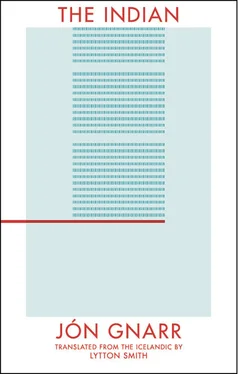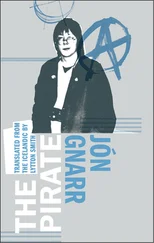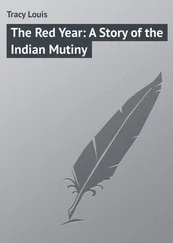We run into the forest and throw ourselves down in the shade of a large tree. I check my pants. There’s a fist-sized hole burned into the bottom of one leg. The skin of the leg is red and swollen and it’s really singed.
— Are you hurt?
— Yes, I say.
Actually, nothing hurts. Just a tiny sting. Indians never feel pain. They can run if they have a broken foot and shoot a bow if both their hands are broken. No matter how much you torture them, they never tell. I make it look like I’m feeling great, but I’m not doing so well.
— I looked down and my whole leg was on fire! I report.
— You burned your hair, too.
I don’t believe that! Stebbi points and I feel my hair. It’s singed in places! Mom won’t be happy. I get tears in my eyes at the thought. Mom’s going to find out it was me who set the fires in the area. She’s going to majorly scold me. Instantly my daring thoughts turn into a paralyzing fear. No Indian is so strong that he is unafraid of his mother. I can’t take it, and I start crying.
We wriggle to our feet and run out of the forest. We look carefully around us before we climb over the fence. We jump up onto the pavement and walk casually home. No one seeing us could suspect that we’d been setting fires. We look like two really good boys coming from visiting their grandmother. I even feign surprise at the smoke, and we look at it, shocked, like we don’t understand how people can get up to such mischief.
Suddenly, the screeching sound of brakes, a splitting siren. Two fire engines zoom past at top speed with lights flashing, an ambulance immediately on their heels. We hurry after them. This we don’t want to miss. Moments later, the cops come by. The blood in my veins freezes. We’re going to be arrested. We might even go to jail. I want to run and hide in a nearby yard. But I can’t move. My lower lip starts quivering uncontrollably. The incriminating evidence is all over me. I’m literally red-handed. I’m ready to confess everything and try to escape with a promise never to do it again. Never! But the police have no interest in us; they drive past at full speed.
— We ought to go home.
— Hold on.
— Jónsi!
— I want to see. Come on.
We edge nearer to the cars. What an exciting spectacle! Everything has been upended. Cops and firefighters wearing yellow rubber clothes are running about. The fire is unbelievably large. I feel a humble pride that this was our handiwork. The firefighters are spraying the fire with a really powerful hose. No one notices us or stops us. On one fire truck, there’s a box full of special rakes. The men are beating the flaming grass with them. I make a decision. Without saying a word, I grab a rake and go out onto the burning battlefield. I smack the fire like my life depends on it. A warlike fireman nods his head, pleased with me. I call to a guy with a hose and point out a flaming tussock.
— It’s over here, too!
They direct the hose there. I run under the jet, unafraid, and smack the fire down with a rake. Then I give the signal that everything is okay. They direct the hose elsewhere. Stebbi watches me, his eyes full of admiration. I’m a hero. I’m fearless in the face of fire. And I was almost burned to death. I’m going to be a fireman when I grow up. I’m going to save people and go to school and teach kids not to tamper with fire. I hammer and smack the rake alongside the firemen until the whole fire is put out.
By this time, a lot of people are watching. Nobody, though, dares to help out. I’ve got wet through and am soot-black up to my head. I walk over to Stebbi.
— Well, now we’re done, I report, smugly.
A heavy hand is on my shoulder. I feel a surge of panic when I look up and see a big cop and another, still larger, behind him. I think maybe someone saw us light the fires and told the police. I try to make my features as surprised and innocent as I can.
— Hey, you kids, says the policeman.
I can feel my heart beat ever faster. I’m going to be put in cuffs. In my mind, I make up fake stories about our day. If someone saw us in the valley, then I’m going to say we were headed to see pigs on a farm, for a school project. Then they’ll think we are well-behaved boys who are always learning, the sort of boys who don’t set fires.
If no one saw us, then we were going to visit a disabled boy, the brother of a boy in our class. In that case, we’re also very good.
But an alibi proves unnecessary.
— You’re helpful boys, says the cop.
I breathe easy. No one suspects us of mischief. We’re heroes. The firemen come over and congratulate us. One pats me on the head in a friendly way.
— Yes, if only all boys were so conscientious.
— Did you see who started the fire? asks the cop.
I’m right in with a response. It’s my standard reply in these situations, something I always tell an adult if they suspect I’ve broken something. It comes in handy a lot. It’s one hundred percent convincing.
— It was some teenagers, I think. At least, I saw them running away.
It’s good to blame teenagers because adults always think they’re up to no good. Teenagers are also really annoying. Everyone thinks so.
The cop nods. He’s completely sold.
— Can I get a picture of you with the boys?
It’s a photographer from one of the newspapers.
— Say cheese!
We pose with the officers and firemen. He takes a picture.
— Magic, he says.
After endless thanks and praise, the police take us home.
The policeman goes with me to the front door.
Mom’s face falls when she sees me.
— What have you done now?
— I just helped some firemen put out a small fire.
The policeman backs up my story, telling my mother how lucky she is to have such a thoughtful and hard-working boy and how I helped them extinguish the fire.
— Some teenagers started it, I say.
I can see Mom isn’t completely convinced. She never believes me. It’s like she can tell when I’m lying. But my story isn’t wholly untrue. I did help them put out the fire.
I take a bath. Mom cleans my hair and cuts off the burned parts. I don’t say anything. She doesn’t, either. She’s decided not to ask me anything. She’s aware it pays to know as little as possible. Yet I know what she knows: that it was me who started the fire. I try to find something to say, but nothing comes to mind.
The next day, there’s a picture of me and Stebbi on the back of the Daily News under the headline WILDFIRE IN FOSSVOGUR. The article says that the fire department only just managed to save the forest from being completely burned to the ground. There was significant damage to trees that had recently been planted. And the neighboring houses had been at great risk from the fire. Several were evacuated due to the danger; one person had to go to the hospital because of smoke inhalation. Under the picture of me and Stebbi, it said: “Two boys who helped put out the fire.”
I don’t show my mother the picture.

[…] He seems very distant in his character; his social inclination is far behind what is expected for his age group. The boy seems unable to consider the consequences of his actions, and is only able to make weak and futile attempts to bring some structure to his thoughts and his world. If the boy’s environment is not to blame, I strongly suspect he is brain damaged.
(National Hospital, Psychiatric Ward,
Children’s Hospital Trust, 07/03/1977)

I creep along the hallway. No one hears a thing. I open the kitchen cabinet gently and take out a roll of butcher’s string. Mom uses this string to stitch together Icelandic haggis. I tear off a decent length and put the butcher’s string back in the cupboard.
Читать дальше




![О Генри - Бабье лето Джонсона Сухого Лога [The Indian Summer of Dry Valley, Johnson]](/books/407344/o-genri-babe-leto-dzhonsona-suhogo-loga-the-india-thumb.webp)









